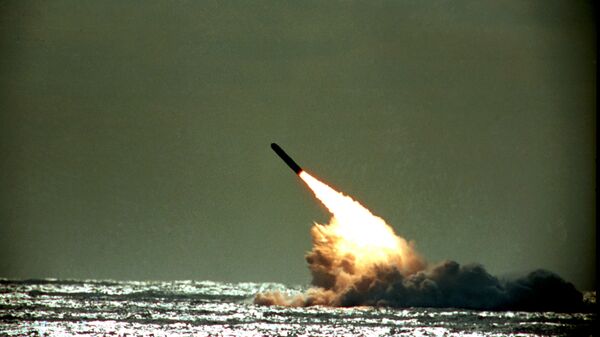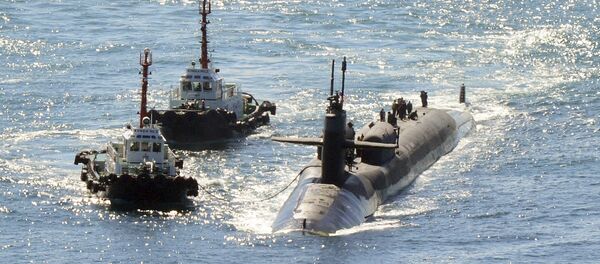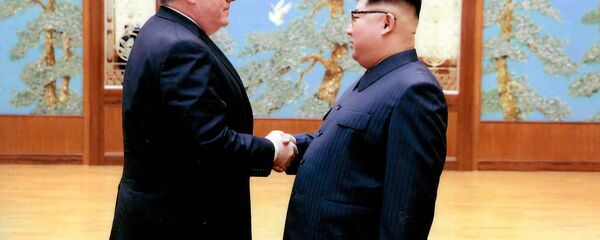The process is "a joint business," the statement run by Korea Central News Agency (KCNA) says, noting that "it cannot be achieved unless both Korea and the United States strive tougher."
At the June 12 summit in Singapore, North Korean leader Kim Jong Un agreed with US President Donald Trump to a mutual pledge toward total denuclearization of the Korean Peninsula. However, since then, Kim has made clear that his country, formally named the Democratic People's Republic of Korea (DPRK), has no intention of disarming unilaterally, having obtained nuclear weapons as a guarantee of self-defense in the first place.
"The proper definition of denuclearization of the Korean Peninsula is completely eliminating the American nuclear threat to North Korea before eliminating our nuclear capability," Tuesday's statement reads. "The United States must now recognize the accurate meaning of the denuclearization of the Korean Peninsula, and especially must study geography."
"When we talk about the Korean Peninsula, it includes the territory of our republic and also the entire region of [South Korea], where the United States has placed its invasive force, including nuclear weapons," the statement continues. "When we talk about the denuclearization of the Korean Peninsula, it means the removal of all sources of nuclear threat, not only from the South and North, but also from areas neighboring the Korean Peninsula."
It's unknown what nuclear weapons are stationed in the vicinity, and a US defense official contacted by CNN said, "We do not discuss the location of nuclear weapons." However, they noted that in the 1990s, "President George H.W. Bush announced the withdrawal of all naval and land-based tactical nuclear weapons deployed abroad."
Although the DPRK has taken many unilateral steps toward ending its nuclear program, including the dismantling of its nuclear testing ground and parts of a missile engine test facility, along with having suspended nuclear and long-range missile tests, the US is adamant that the DPRK must produce more unilateral proof of its intention to comply with the June 12 agreement before the US will lower economic sanctions against the country, which leave it with few opportunities for international trade.
Most recently, Pyongyang said in September it would dismantle its main nuclear facility at Yongbyon, which produces plutonium and tritium for thermonuclear weapons, if the US responded with "corresponding measures," which KCNA later specified as sanctions relief.
In turn, Western think tanks and media regularly drum up rhetoric claiming to have discovered some new secret test facility that proves the North Koreans aren't engaging in good faith or that some new action or statement proves Trump's folly at having trusted Kim to disarm.
"If we unilaterally give up our nuclear weapons without any security assurance despite being first on the US list of targets for pre-emptive nuclear strikes, that wouldn't be denuclearization — it would rather be a creation of a defenseless state where the balance in nuclear strategic strength is destroyed, and the crisis of a nuclear war is brought forth," the KCNA statement said.
"The corresponding measures we have asked the United States to take aren't difficult for the United States to commit to and carry out. We are just asking the United States to put an end to its hostile policies and remove the unjust sanctions, things it can do even without a snap of a finger."
Yang Moo-jin, a professor at Seoul's University of North Korean Studies, told AP Thursday that "Pyongyang is sending a message to Washington that confrontation and dialogue cannot coexist."
On the other side of the coin, 2018 has been a year of growing warmth between North and South Korea, which began in February with a joint Korean team competing in the Pyeongchang Winter Olympics, in September saw a historic end-of-war declaration by Kim and South Korean President Moon Jae In in Pyongyang, and most recently brought the relaxation of tensions along the demilitarized zone separating the two countries, including limited train passage, trade and tourism.
Commentary on 38 North, a website dedicated to analysis of Korean politics, noted late last month that at this stage in negotiations, demanding from Kim "a full and complete declaration and to agree on adequate verification measures" about the dismantling of North Korean nuclear weapons was "a dead end because it is tantamount to surrender."
"[I]nsisting on this approach is a dead end, certainly as long as Washington continues to apply ‘maximum pressure' instead of moving to implement the steps on normalizing relations that President Trump agreed to in the June Singapore statement," wrote 38 North contributor Siegfried S. Hecker.
Clearly, Trump and Kim will have much to discuss at their proposed second summit in early 2019.






